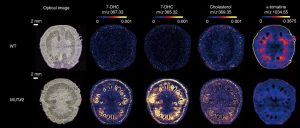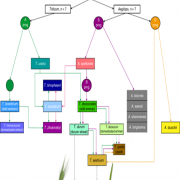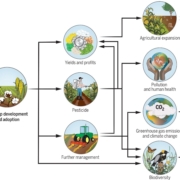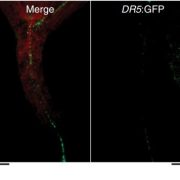Biofortified tomatoes provide a new route to vitamin D sufficiency (Nature Plants)
 Vitamin D deficiency in humans is correlated with malfunction of the immune system and inflammation together with cancer, Parkinson disease, depression, neurocognitive decline, dementia, and severe COVID-19 infection. In humans, exposure of the skin to UV light promotes the production of Vitamin D from a precursor, 7-dehydrocholesterol (7-DHC), also known as provitamin D3, but most vitamin D has a dietary source. The best natural sources of vitamin D are fish and dairy products as the amount found in plants is generally low, which can be a problem for the vegan and vegetarian people. Provitamin D3 (7-DHC) is synthesized in tomato leaves through the steroidal glycoalkaloid (SGA) synthesis. It has been observed that there is a duplicated pathway in Solanaceous species for SGA synthesis. In this work, Li et al. engineer one of the SGA biosynthesis pathways for 7-DHC accumulation in tomato fruit and leaves. Using CRISPR/Cas9, the authors blocked 7-dehydrocholesterol reductase (Sl7-DR2) in order to avoid the conversion of 7-DHC to cholesterol. Sliced fruit and leaves with accumulated 7-DHC were exposed to UVB light resulting in high yields of vitamin D3. The loss of Sl7-DR2 activity had no effect on the growth, development or yield of tomato lines. This work suggests the use of tomato as a plant-based sustainable source of vitamin D3. (Summary by Eva Maria Gomez Alvarez, @eva_ga96) Nature Plants. 10.1038/s41477-022-01154-6
Vitamin D deficiency in humans is correlated with malfunction of the immune system and inflammation together with cancer, Parkinson disease, depression, neurocognitive decline, dementia, and severe COVID-19 infection. In humans, exposure of the skin to UV light promotes the production of Vitamin D from a precursor, 7-dehydrocholesterol (7-DHC), also known as provitamin D3, but most vitamin D has a dietary source. The best natural sources of vitamin D are fish and dairy products as the amount found in plants is generally low, which can be a problem for the vegan and vegetarian people. Provitamin D3 (7-DHC) is synthesized in tomato leaves through the steroidal glycoalkaloid (SGA) synthesis. It has been observed that there is a duplicated pathway in Solanaceous species for SGA synthesis. In this work, Li et al. engineer one of the SGA biosynthesis pathways for 7-DHC accumulation in tomato fruit and leaves. Using CRISPR/Cas9, the authors blocked 7-dehydrocholesterol reductase (Sl7-DR2) in order to avoid the conversion of 7-DHC to cholesterol. Sliced fruit and leaves with accumulated 7-DHC were exposed to UVB light resulting in high yields of vitamin D3. The loss of Sl7-DR2 activity had no effect on the growth, development or yield of tomato lines. This work suggests the use of tomato as a plant-based sustainable source of vitamin D3. (Summary by Eva Maria Gomez Alvarez, @eva_ga96) Nature Plants. 10.1038/s41477-022-01154-6








